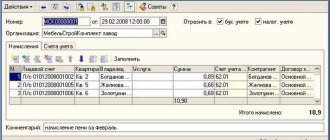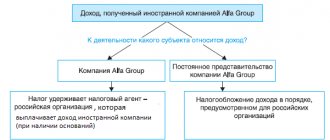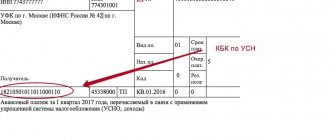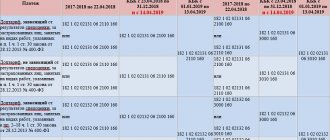There are as many types of taxes as there are so many penalties and fines for them. Each type requires its own payment form with special details. The details will even depend on whether you voluntarily intend to pay fines and penalties or not.
Elba prepares payments for penalties and fines automatically if a request for their payment has been received in the Letters section. You will see the “Pay or download payments” button in the open request.
If you haven’t received a request from the tax office, or you want to do away with your tails voluntarily, read our instructions. The tax website will help you create a payment slip. Here is the page for individual entrepreneurs, and here is for LLC.
The procedure for collecting tax debt through court
The 2nd difference in the payment for penalties is the basis of the payment (field 106). For current payments we put TP here. Regarding penalties, the following options are possible:
- We calculated the penalties ourselves and pay them voluntarily. In this case, the basis for the payment will most likely have a code ZD, that is, voluntary repayment of debt for expired tax, settlement (reporting) periods in the absence of a requirement from the Federal Tax Service, because we, as a rule, transfer penalties not for the current period, but for past ones.
- Payment of penalties at the request of the Federal Tax Service. In this case, the payment basis will have the form TP.
- Transfer of penalties based on the inspection report. This is the basis of payment to AP.
All three of the above cases are discussed in detail in the Ready-made solution from ConsultantPlus. Samples of filling out payment forms are provided for each of them.
Read more about payment details in this article.
Depending on what served as the basis for the payment, filling out this field will vary:
- In case of voluntary payment of penalties (the basis of the PP), there will be 0 here, because penalties do not have a frequency of payment, which is inherent in current payments. If you are listing penalties for one specific period (month, quarter), it is worth indicating it, for example, MS.08.2019 - penalties for August 2021.
- When paying at the request of tax authorities (basis of TR) - the period specified in the request.
- When repaying penalties according to the verification report (the basis of the AP), they also put 0.
In case of partial or complete non-payment of tax, the required amount will be collected from the individual through the court.
Unless otherwise provided by paragraph 2.1 of this article, in case of non-payment or incomplete payment of the tax within the established period, the tax is collected in the manner prescribed by this Code. (as amended by Federal Law No. 150-FZ dated June 8, 2015) Tax collection from an organization or individual entrepreneur is carried out in the manner prescribed by Articles 46 and 47 of this Code. Tax collection from an individual who is not an individual entrepreneur is carried out in the manner prescribed by Article 48 of this Code.
Part 2 of Article 45 of the Tax Code of the Russian Federation
Let's look at the procedure for collecting TN in accordance with Art. 48 Tax Code of the Russian Federation.
Having discovered the debtor, within 3 months or within a year (for debts less than 500 rubles), the Federal Tax Service is obliged to send him a demand for payment of the debt. The demand will state the full amount owed, including interest and applicable late fees. You have 8 days to pay the debt.
If the debtor ignored the requirement and did not transfer funds to the tax office within this period, then within six months of the delay, the tax office sues for non-payment of the tax charge in order to collect the debt from the property of the car owner.
The tax office has the right to demand debt collection through the court only if the total amount of debt for fines, taxes and penalties exceeds 3,000 rubles. Demand through the court the payment of debts in an amount less than 3,000 rubles. possible only after 3 years have passed after the payment is overdue.
The court considers the application for debt collection without the presence of the parties and makes a judgment. The court decision is transferred to the bailiffs, who will be involved in the forced collection of the debt at the expense of the defaulter’s property.
1Cash in bank accounts, as well as electronic money;
2Cash;
3Property that is transferred under an agreement into the possession of other persons, without the right to own it upon termination of such agreements;
4Other property - except that which is intended for everyday use by an individual and members of his family (items of ordinary home furnishings and household items, personal items (clothing, shoes, etc.) with the exception of jewelry and other luxury items).
In the event of seizure of property that is not cash, the debt will be considered repaid after the sale of this property and deposit of the proceeds into the treasury.
Legal consultation
Get qualified help right now! Our lawyers will advise you on any issues out of turn!
1. In the event of failure by a taxpayer (payer of fees) - an individual who is not an individual entrepreneur (hereinafter in this article - an individual), within the established period of time, the obligation to pay a tax, fee, penalty, fines, the tax authority (customs authority) that sent the demand for the payment of taxes, fees, penalties, fines (the tax authority at the place of residence of an individual in the event of deregistration of this person with the tax authority that sent the request for payment of taxes, fees, penalties, fines), has the right to apply to the court with an application for collection of the tax , fees, penalties, fines at the expense of property, including funds in bank accounts, electronic funds, transfers of which are carried out using personalized electronic means of payment, and cash funds of a given individual within the amounts specified in the request for payment of taxes, fees, penalties, fines, taking into account the specifics established by this article. (as amended by Federal Laws dated June 27, 2011 N 162-FZ, dated July 23, 2013 N 248-FZ) An application for the collection of taxes, fees, penalties, fines from the property of an individual (hereinafter in this article - the application for collection) is submitted in relation to all claims for payment of taxes, fees, penalties, fines for which the deadline for execution has expired and which have not been fulfilled by this individual on the date the tax authority (customs authority) filed an application for collection with the court. The specified collection application is submitted by the tax authority (customs authority) to the court if the total amount of tax, fee, penalties, fines to be recovered from an individual exceeds 3,000 rubles, except for the case provided for in paragraph three of paragraph 2 of this article. (as amended by Federal Law No. 20-FZ dated March 4, 2013) A copy of the application for collection no later than the day it is filed with the court is sent by the tax authority (customs authority) to the individual from whom taxes, fees, penalties, and fines are collected. 2. An application for collection is submitted to a court of general jurisdiction by a tax authority (customs authority) within six months from the date of expiration of the deadline for fulfilling the requirement to pay taxes, fees, penalties, fines, unless otherwise provided by this paragraph. If, within three years from the date of expiration of the deadline for fulfilling the earliest demand for payment of taxes, fees, penalties, fines, taken into account by the tax authority (customs authority) when calculating the total amount of tax, fees, penalties, fines to be recovered from an individual, such amount taxes, fees, penalties, fines exceeded 3,000 rubles, the tax authority (customs authority) applies to the court for collection within six months from the day when the specified amount exceeded 3,000 rubles. (as amended by Federal Law No. 20-FZ dated 04.03.2013) If, within three years from the date of expiration of the deadline for fulfilling the earliest demand for payment of taxes, fees, penalties, fines, taken into account by the tax authority (customs authority) when calculating the total amount of tax , fees, penalties, fines to be collected from an individual, such amount of taxes, fees, penalties, fines does not exceed 3,000 rubles, the tax authority (customs authority) applies to the court with an application for collection within six months from the date of expiration of the specified three-year term. (as amended by Federal Law No. 20-FZ dated 04.03.2013) The deadline for filing an application for recovery missed for a good reason may be restored by the court. 3. Consideration of cases on the collection of taxes, fees, penalties, fines at the expense of the property of an individual is carried out in accordance with the legislation on administrative proceedings. (as amended by Federal Law No. 23-FZ dated 03/08/2015) A demand for the collection of taxes, fees, penalties, fines at the expense of the property of an individual may be presented by the tax authority (customs authority) in the manner of claim proceedings no later than six months from the date of issue court ruling to cancel the court order. If the deadline for filing an application for recovery is missed for a valid reason, it may be restored by the court. The application for collection may be accompanied by a petition from the tax authority (customs authority) to seize the property of the defendant in order to secure the claim. 4. Collection of taxes, fees, penalties, fines from the property of an individual on the basis of a judicial act that has entered into legal force is carried out in accordance with the Federal Law “On Enforcement Proceedings”, taking into account the specifics provided for in this article. 5. Collection of taxes, fees, penalties, fines from the property of an individual is carried out sequentially in relation to: 1) funds in bank accounts and electronic funds, transfers of which are carried out using personalized electronic means of payment; (as amended by Federal Law No. 162-FZ of June 27, 2011) 2) cash; 3) property transferred under an agreement for the possession, use or disposal of other persons without the transfer of ownership of this property to them, if in order to ensure the fulfillment of the obligation to pay taxes, fees, penalties, fines, such agreements are terminated or declared invalid in the prescribed manner; 4) other property, with the exception of those intended for everyday personal use by an individual or members of his family, determined in accordance with the legislation of the Russian Federation. 6. In the case of collection of a tax, fee, penalty, fines at the expense of the property of an individual that is not cash, the obligation to pay the tax, fee, penalty, fines is considered fulfilled from the moment of sale of such property and repayment of the debt from the proceeds. From the date of seizure of the specified property and until the day of transfer of the proceeds to the budget system of the Russian Federation, penalties for late transfer of taxes and fees are not charged. 7. Officials of tax authorities (customs authorities) do not have the right to acquire property of an individual sold in the execution of judicial acts on the collection of taxes, fees, penalties, fines at the expense of the property of an individual.
We invite you to read: Trade fee reduces income tax
Article 48 of the Tax Code of the Russian Federation
As you can see, the liability for failure to pay car taxes is quite serious, but it only applies if the taxpayer ignores all requests to pay fines, fees and penalties.
How are penalties calculated for non-payment of transport tax?
The procedure for calculating penalties for taxes is not some special classified information. This is clearly stated in Russian legislation (clause 4 of article 75 of the Tax Code).
There are two forms and two calculation formulas.
1) For individuals and legal entities whose overdue payment is no more than 30 days.
Penalties = Amount of tax not paid on time * Central Bank key rate: 300 * number of overdue days
2) For all legal entities (companies, firms, JSC, LLC, etc.) that are overdue for tax payments by more than 30 days.
Penalties = Amount of tax not paid on time * Central Bank key rate: 150 * number of overdue days, starting from 31
The total debt is summed up using two formulas.
To correctly calculate the penalty, it is important to consider the following points:
- Transport tax is calculated once a year and must be paid to the local Federal Tax Service. The penalty accrues after 3 months. after delays.
- The property fee is also paid to the local inspectorate. Accrual occurs immediately.
- Income tax goes to the regional budget (a small part goes to the federal center). The penalty begins to “drip” after 1 month. delays.
The Ministry of Finance in letter No. 03-03-РЗ/39299 2021 clarified what is considered the time of debt repayment - the day of payment. Moreover, on the day of presentation of payment receipt, no penalty is charged.
Different formulas are used for calculations depending on how the person is registered
There are many websites where an online calculator will calculate the penalty for any overdue tax. To find such a resource, just enter the corresponding query into the Yandex or Google search bar.
The ConsultantPlus web service has a selection of tools for legal entities and individuals that inspire maximum confidence. As a rule, these are websites of government organizations that provide various government services.
How to pay penalties on taxes
The most common way is by receipt. Most often, a person finds out that he has been charged penalties when the payment arrives. Less often, he goes to the Federal Tax Service himself to get a certificate about the status of tax payments or to make a reconciliation.
Many modern people, even if they have a receipt, do not understand how to pay tax penalties online. There is such a way. Through your Sberbank online personal account. You can also use it when you don’t have a receipt (didn’t arrive, got lost, etc.).
You can pay the penalty through the bank app
Step-by-step instruction:
- Log in to your personal account.
- Open the “payments and transfers” section. In the services in the second column about.
- Select “search and payment of taxes to the Federal Tax Service”. Or immediately enter the identification number (TIN) into the search bar.
- Provide a service for searching for overdue contributions and fees.
- Then mark the card to be written off and enter the TIN number. Click “pay”.
- Then pay like any other transaction in Sberbank online, waiting for the digital code via SMS.
Through the Sberbank resource, you can not only pay off all state duties of an individual (transport, land, etc.), but also use the same action to check non-payment of taxes according to the TIN.







